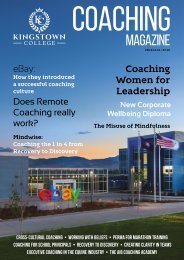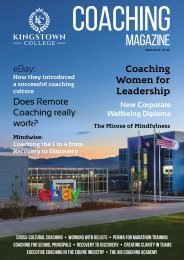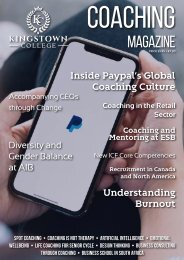Kingstown College Coaching Magazine vol.5 2019/2020
Welcome to another information filled publication of our Coaching Magazine!
Welcome to another information filled publication of our Coaching Magazine!
- No tags were found...
You also want an ePaper? Increase the reach of your titles
YUMPU automatically turns print PDFs into web optimized ePapers that Google loves.
66 Coaching Magazine Vol.5
for new ideas and approaches, before
presenting them to the Board or the
staff; provided the chance to learn from
someone else’s mistakes; and provided
insights into the politics and decisionmaking
processes and structures in other
organisations. Mentees commented on
the confidential support in a trusting
atmosphere, feeling empowered, having
the space to think “outside the box” to
discuss issues that can arise between
boards and CEOs, the benefit of having
open and challenging discussions, the
experience of the coach, of the “wise
non-intrusive response”.
Challenges for mentees include
allocating time and energy to the
Scheme, exposing themselves to
critique; taking the risk to try out new
ways of thinking and working.
In addition to supporting mentees
to do their work more effectively,
some mentors commented on the
expertise being of direct benefit to
the mentee’s organisation (in many of
these cases, the boards were aware of
the mentoring programme and in some
engaged with the process to review
how they operated as a board). Many
mentors were surprised at the lack
of governance skills at board level in
some organisations. In some cases
they supported the mentee to bring
new people with greater governance
skills onto their boards or to move
their boards’ focus from operational to
strategic issues.
Clutterbuck notes that “The golden
rule seems to be to have a relatively
formal structure for the programme, but
as much informality as possible within
the relationship.” This is one of the key
successes of the Carmichael scheme,
with a formal process (application,
rounds of mentoring, documentation)
and an informal and flexible relationship
between mentees and mentees.
The Scheme is increasing executive
capacity within the sector, albeit on
a relatively small basis, by providing
an opportunity for learning and
development for the leaders, the
organisations they work in and the
organisations that mentees may
move to in the future. The Carmichael
Mentor Scheme is dependent on the
commitment of mentees to engage
in the Scheme and is indebted to
the goodwill of mentors to make the
Scheme possible and to providing this
invaluable service.
If you would like to join the
Scheme as a mentor, please
contact Diarmaid Ó Corrbuí,
Chief Executive, Carmichael,
North Brunswick Street, Dublin 7.
Tel 01-8735702.
diarmaid@carmichaelcentre.ie
www.carmichaelcentre.ie
Adrienne Collins
Adrienne Collins is a Social Policy & Research Executive with the Citizens Information Board. She has also worked in the HR & Governance and
Training teams in CIB. She worked previously for Carmichael Centre for Voluntary Groups, Irish Council for Overseas Students and Co-operation
North. Adrienne has sat on boards of Irish Refugee Council and Voluntary Service International. She has done short term voluntary work in India,
Sri Lanka and Ghana and performed a range of other volunteer roles. Adrienne has a Degree in Economic & Social Studies, a Master of Equality
Studies, an Advanced Diploma in Personal & Executive Coaching, a Certificate in Corporate Governance for Not For Profit Organisations and an
Advanced Facilitation Skills certificate.
About Mentoring
According to Clutterbuck, good mentors mix challenge and stimulation with empathy and concern.
Mentors need a range of skills, the most important one being to be an active listener. Others include
coaching, being a critical friend, a role model, providing a “guiding” rather than a “doing” hand. The
mentor’s role is to share their knowledge, to listen and provide context to issues and problems, to act
as a sounding board, to aid in exploring consequences of potential decisions, to provide information
and also feedback, to facilitate self-discovery, to challenge, to encourage exploring new ideas.
The programme works best where the coachability of the mentee is high – where they are committed
and motivated to improve and/or change. Mentors engage in asking provoking or powerful questions
to create movement in the way the mentee thinks.






